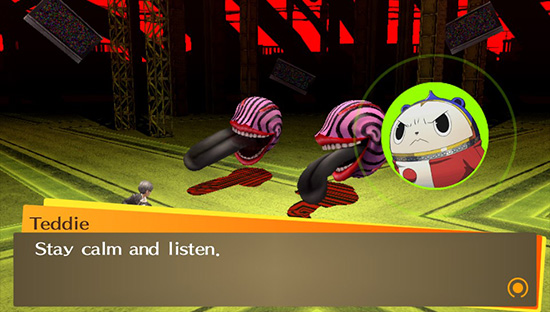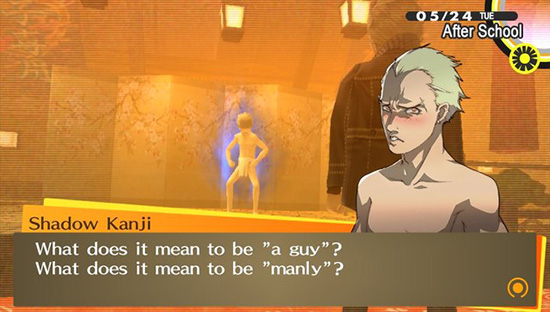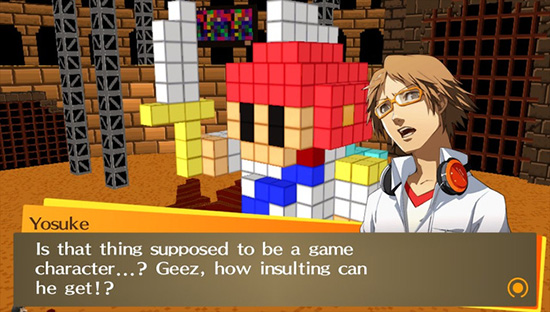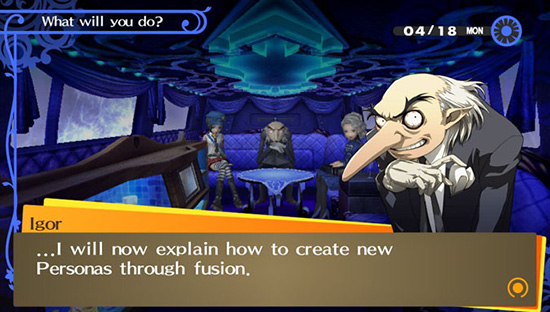 |
| Andrew Barker |
Confront your shadows.
01.12.14 - 11:48 AM
A few months ago, I finally found time to sit down and play Persona 4. Yeah, I'm a little late to the party, I know. So glad I had the chance though, as it's definitely one of the best RPGs I've played. For those of you who have played it, you'll know how important the concept of identity, and how an individual understands it, is within the game. The story revolves around it, your powers in battle stem from it, and the protagonist lacks it so you can put yourself in his shoes and answer the game's questions for yourself. As you likely know, the latter of these is the basis for the genre's name.

But understanding your own identity is not a simple task like Persona 4 would have you believe. Jump into a television, beat up some shadows, and confront your true self? Piece of cake! I challenge you to open up a document and start writing a list under the heading "what is my true self?" You might write your roles in life: son, daughter, father, mother, sibling, friend, employee, student, or even gamer! Maybe you would write about your religious beliefs, culture or ideals. What are your good and bad attributes? Humour me, and take a moment to write down as much as you can. Don't worry, I'm going somewhere with this.
According to American philosopher Bruce Wilshire, social identity is a combination of an "on-stage" that a person shows to others, and a "back-stage" that is hidden from others. His work in this instance was focused on actors portraying roles in the theatre, but it applies to role-playing in video games too. What better game than Persona 4 to see this in action? The entire main cast must confront aspects of their back-stage identities that shame and embarrass them in front of others. As you may remember, these issues cover a broad spectrum from family problems to personal confidence and sexuality. After overcoming their back-stage identities (shadows), they learn to accept them and are empowered by them in the form of Personas.
So, let's go back to the list I had you write a little while back. Firstly, see if you wrote down anything that may not be true, but that you felt you should write, and then delete them. Now, take a look over it again and note which elements are part of your on-stage identity, and which are only shown to your closest friends and family, if anybody, especially if you are embarrassed by them. Any surprising results? Accept them, and you will awaken your Persona! Well, maybe not. The point is, personal identity is complex, and how you present yourself to different people may vary dramatically. Even if you spent a good deal of time writing your list, there will still be things you missed. Determining which parts of you are shown and hidden can be tricky too.

To delve a little deeper into role-playing, let's talk about defining yourself within the context of a game. When you play a title where you are able to create a character or makes choices, how do you play? Do you create a character who looks like you and responds to situations as you would? Or maybe someone who you would like to be? Maybe you just joke around instead. All approaches are equally valid, but can provide interesting insight into your own nature. For example, I was chatting to a friend on Steam not long ago about Saints Row 3. I told him that even though I had a lot of fun with it, I always swerved to avoid hitting pedestrians. Games such as The Walking Dead are perhaps the best chances to see how you would respond in out-of-this-world situations. Deciding whether or not to stab a cannibalistic man with a pitchfork in front of a little girl might not give you real insight into your identity, but it's interesting to note how you genuinely react nonetheless (I stabbed him good, by the way).
If we throw online interactions into the mix, specifically MMOs, their anonymity provides a way for people to express and experiment with their back-stage interactions with others. When I was in my teen years and playing World of Warcraft, I would act differently while playing than I would face-to-face in real life; I was confident, assertive and more "social." Many years later, the "me" in online games now acts much the same as the "me" in everyday life: a go-with-the-flow kind of guy. But perhaps that's because I have a better understanding of myself as an adult.

I'm obviously not alone, since in a 2006 study by social scientist Nicholas Yee, it was determined that the majority of MMO players acted much the same in-game as out of game. That's not entirely surprising, but what was, at least to me, was that 39% of men and 53% of women felt that their online friends were comparable to, or in some cases better, than their real life friends. That's a pretty sizeable percentage of players. There's a variety of reasons why this might be the case, but the study suggested it was at least partly due to "hyperpersonal interactions." Since communication in games is generally restricted to text, it means players are able to pause and take time to consider their words. In real life, answers are usually expected immediately, but in the virtual world, players can modify their identity in a way that is true to the original, but a more thoughtful, well-presented version of it. Perhaps it is then no surprise that, removed from social pressures, a third of players felt they were "more themselves" in game than in their real lives. It also provides a platform to discuss sensitive issues about themselves that players may not want to reveal to people they know out of the game.
Beyond the role-playing opportunities offered by MMOs stand table-top RPGs such as Dungeons & Dragons. Players may create and use the same characters over months or even years throughout a campaign, so it's no surprise that they grow attached to them. Though many players choose to create characters unlike themselves, consciously or subconsciously, this character is still a segment or representation of their own mind and identity, just with indirect input from the game's rules and systems. Writing a character unlike yourself in a book is an easier task, but role-playing such a character where you must react and think instantly is far more difficult, if not impossible. Your own identity as a player inevitably helps to define that of your characters.

In German philosopher Johann Fichte's theory of subjectivity, an individual is made up of many different facets and identities that are all related, but never truly whole. We see these aspects of an individual through their role-playing. I can say that my Final Fantasy XIV paladin represents a part of me that wants to be strong and able to protect others, and my choice to always go after the childhood friend in visual novels is probably related to certain events in my life. In Persona 4, this is well represented by the main character's ability to control multiple Personas. He must have one serious identity crisis.
Do you think how you role-play in games reflects who you truly are? Does it provide an opportunity for you to experiment with your own thoughts and feelings? I suspect some of you will wholeheartedly agree, while others just see role-playing as a bit of meaningless fun. But if you do take your role-playing seriously, as you play, I urge you: think about what you are revealing and discovering.
- Wilshire, Bruce. "Role Playing and Identity: the Limits of Theatrical Metaphor." Philosophy Social Criticism 4 (1976).
- Yee, Nick. "The Psychology of Massively Multi-User Online Role-Playing Games: Motivations, Emotional Investment, Relationships and Problematic Usage." Computer Supported Cooperative Work 34 (2006): 194-198.